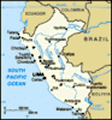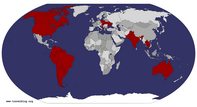Advertisement
Published: July 10th 2010

 Yauli
Yauli
Tucked in a hidden valley...If Huancavelica moves slowly, Yauli goes in reverse. A bucolic settlement forty minutes from Huancavelica by taxi, it is an unassuming town of a few thousand far enough away to leave the tedium of Huancavelica behind but original enough to make a day of it. Within ten minutes of leaving Huancavelica, the taxi turns off to the right and dips along an unpaved road. The track hugs the mountainside. Large birds of prey float overhead. Cattle graze in yellow fields cordoned off by stone fences. The river water looks deceptively clean and fresh.
Rosalinda and I jump in the collective taxi at the noisy and scummy bus depot in Huancavelica. Just two minutes later, the final third and fourth passengers arrive. Collective taxis only leave when full, meaning it could be a quick wait or it might take hours until departure. For her it is an adventure. Running off to an unknown village for very little reason other than it is there didn’t occur to her before. Now she is a willing accomplice not too terribly interested in the destination as much as the experience. Since leaving Lima, she has been on a discovery tour of her own country.
Upon entering

 Vote for Cura!
Vote for Cura!
Politics is hard to disregard in Yauli..Yauli proper, the road becomes paved again. The taxi comes to stop a few yards in front of the main plaza. Both Rosalinda and I get out, spin around, and arrive at the same conclusion without sharing it with each other: What are we doing here? Indigenous women in those snappy fedoras crochet scarves on the curb. Yauli sports one functioning and very rudimentary restaurant, a chifa, of Chinese cuisine. A kaleidoscope of stray dogs prance around (some hobble) in search of food scraps or attention, both of which Rosalinda dishes out in healthy portions. I take particular note of one pooch, perhaps the result of a one night stand between a Great Dane and a poodle. It is tall and attentive. Its legs are stilts that support the rest of its extremely curly-haired frame. Inescapable eyesores of painted political signs and slogans reign over home fronts and even stairways leading up to the hillier neighborhoods. If the mayoral election were held today, some guy named Cura would win, already having his name plastered all over the place in a greater percentage than his opponent. Curiously enough, the election isn’t until next year. Wood smoke wafts through the same air

 Vibrant Colors
Vibrant Colors
At textile shop (For you European readers, notice how I spelled "colors" correctly??warmed by the stinging sunshine. As I sit and watch a Toyota 4 x 4 police vehicle crawl by, a novice is practicing the saxophone behind a closed door. Women bob in and out of the shallow shops to buy provisions. Yauli is deliberate, almost provoking the desire for an afternoon slumber.
We find our way down a slope to a workshop where a cooperative of women weave textiles. Three manually operated looms dating back decades produce fine, colorful, and smooth alpaca scarves, gloves, and hats. The ladies manage to settle their wide frames onto stools of very limited breadth. None complain, few speak. They meticulously stitch and attend to fine details in the decorative designs of their current project. León, the manager, escorts me over to the shelves heaving with spools of vivid, rich, and colorful yarn. “So, León, do you buy the yarn from a supplier who spins it from alpaca wool?”
“Oh, no. We buy all the yarn from Lima.”
“Lima?”
“Sure, it is cheaper. We get a better price. They deliver it to us, then we make the product for sale.”
“Oh,” is all I could come up with. It made little sense to transport raw

 Attending to Details
Attending to Details
Ladies sew these pieces by hand...materials so far when their source was grazing about a mile away in a terraced field. “To whom do you sell most of your goods?”
“Yes, yes. A truck comes and picks up everything when it is done. Mostly we sell to stores and distributors in,” let me guess…”Lima.” This makes no sense, yet León and his crew will do what they can to pull a profit on their cottage manufacturing operation.
Rosalinda takes to the terraced fields below the textile shop. She hops from one level to the one underneath until the staircase of fallow land reached the railroad track. The iron rails lead back to Yauli, but first it is necessary to cross a small gulley over which a train trestle passes.
It is only rail and thin cement cross supports that form a bridge, about twenty-five feet across. Looking down there are several gaps wide enough to not exactly fall through, but to do enough damage to an ankle or thigh. Rosalinda skips across paying little attention to the twenty foot or so drop. I try to catch up with her, but slam on the brakes as I approach the first cross support. As Rosalinda turns

 Playing at the Sink
Playing at the Sink
By the time he was done he was soaked...around to see my progress halted she calls out, “What’s the problem? Are you afraid or something?”
Yep, I’m afraid. “Or something.” The more I try to gather myself together, the more I think about twisting over and going down.
“Just put one foot forward and jump across!”
Yeah, right. I recoil on the first three attempts. I experience the same feeling from two years ago when trying to cross a weak wooden plank over a rushing glacial river in Pakistan. On the fourth, I focus my eyes only on the point where the rail and the cross support are bolted together. Rosalinda becomes much quieter as she realizes my phobia has temporarily paralyzed me. One…two…and…I jump across like an elementary school student’s first attempt on a balance beam. I make it across, but reminded myself of a considerable weakness that may resurface again.
Along the river basin, a hydroelectric plant produces enough power to keep Yauli online. The turbines receive their flow of water from a black pipe that surges down from the mountainside. A few hundred yards away I stop to photograph a home on the brink of falling over. Its porous roof is of both ceramic tiles

 A Hop, Skip, and a Jump
A Hop, Skip, and a Jump
Rosalinda hikes down terraced fields...and corrugated metal. It is held down by large stones, a black plastic sack of unknown contents, and used balding tires. Laundry has been hung out to dry, suspended on a line tied at each end to thin logs spiked into the ground. The mother is washing dishes outside at a stone sink. A rooster cackles. It is a scene of rustic poverty, but with a twinge of dignity unknown to its urban counterpart. A drift of pigs forages in the sharp dry brush. Rosalinda cannot help but comment, “Aww, aren’t they so cuuuute!”
“They’d be a lot more useful with a side of steamed vegetables and some mashed potatoes.” Where she sees the chance to take in a new pet, I see wondrous opportunities for dinner. We climb back up to the town square only to look back and see a man on horseback. Hooves smack against the worn and cracked pavement. The horse bursts forward and lifts itself up a steep incline and passes along side us.
We resist jumping in the combi van for the ride back to Huancavelica. Instead Rosalinda suggests very much out of character, “Why don’t we climb to the top of those stairs?”

 No Longer In Use
No Longer In Use
The rail line from Huancayo to Huancavelica...Not in the best shape (Who am I to say?), a brisk walk to the pharmacy can cause her to breather heavily
I’d rather not; it would require effort. My eyes target the top step, almost out of sight. The stairs ascend at an angle reserved for a space shuttle launch. “Absolutely, you first.”
And up she goes. Wouldn’t you know it, the view is splendid and I fired off a few more photos before ending our time in Yauli. The homes along the steep climb are painted advertisements to vote for Cura for mayor. At the top a woman is selling turnover from a cart. A parasol protects her from the painful rays. From a corner printing shop emerges a man in his fifties who takes an interest in me immediately as I try to find a piece of curb where to sit.
“¡Hombre! Sit down!” He had returned to his shop to grab a chair for me. Rosalinda uses it to support her back as she rests on the pavement.
“Gracias.” His fingertips and nails are stained black from operating his very meek hand cranked press.
“Do you like it here in Yauli?”
“Sí, señor.” I did not

 Rural Poverty
Rural Poverty
I cringe when people where I live tell me about how poor folks are in Connecticut. They have no idea...lie. “It is peaceful.” I seek out something gratuitous to add that was also accurate, “I think there are fewer problem here than in Huancavelica. I bet Yauli is a very safe place to be.” I covered myself just in case, “Not perfect, but safe wherever you go.”
“Yes, that is true. Not much happens here.” He inquired about the price of an airline ticket from the States to Lima. “Ah the United States…good place.” I have to agree.
“Do many people come to Yauli to visit? “No, not as much anymore, not many tourists. We here in Yauli need more people to come. We need a lot of things here.”
“Like what?”
“Education. Many of us are illiterate.”
“Weren’t there schools when you were younger so you could learn to read and write?”
“Yes, but they were no good. It didn’t matter, my family thought differently. They…,” he paused.
“Had another set of priorities.”
“Sí. We had to work in the fields. We needed the money.”
“And now children learn well enough?”
“Sí y no. They can read but have no other skills to use for a job.”
Mildly changing topics, “About how many in Yauli today are illiterate,

 The Lone Ranger
The Lone Ranger
These two came out of nowhere...then? What do you think?”
Without so much as a pause, “Seventy percent cannot read at all.”
From behind him the lady vendor calls out from behind her parasol, “Eighty percent!”
“And look,” he added. See that girl?” He points out a rapaciously pretty adolescent, visibly pregnant. “She is fourteen. Girls here have babies at fifteen.”
“Is there a clinic in Yauli?”
“No! The government does nothing!” By this time, five older women have joined in to lodge their complaints to me, as if I could do something about it. “We need medicine, services, jobs! Babies are malnourished. They forget us in Yauli.”
Just as I try to find a way to escape the depressing assault of grievances, the press operator shakes my hand and thanks me for coming. Rosalinda and I skip down the steps and jump in the next van back to Huancavelica. As the van takes to the gravel road, I turn to Rosalinda, “Do you remember when you asked me what the difference is between travelling and going on vacation?”
“Sí.”
“Coming to Yauli is travel. It opens your mind to the world, or even your own country. Going on vacation is a trip to the
beach. Yauli is very, very far from the beach.”
She ponders my words. “I think I am beginning to understand.”
Advertisement
Tot: 0.078s; Tpl: 0.024s; cc: 14; qc: 26; dbt: 0.0336s; 1; m:domysql w:travelblog (10.17.0.13); sld: 1;
; mem: 1.1mb
















Yhony
non-member comment
Yauli Huancavelica
It is really beautiful this place i am from Huancavelica and some times went to yauli and it is really goodd